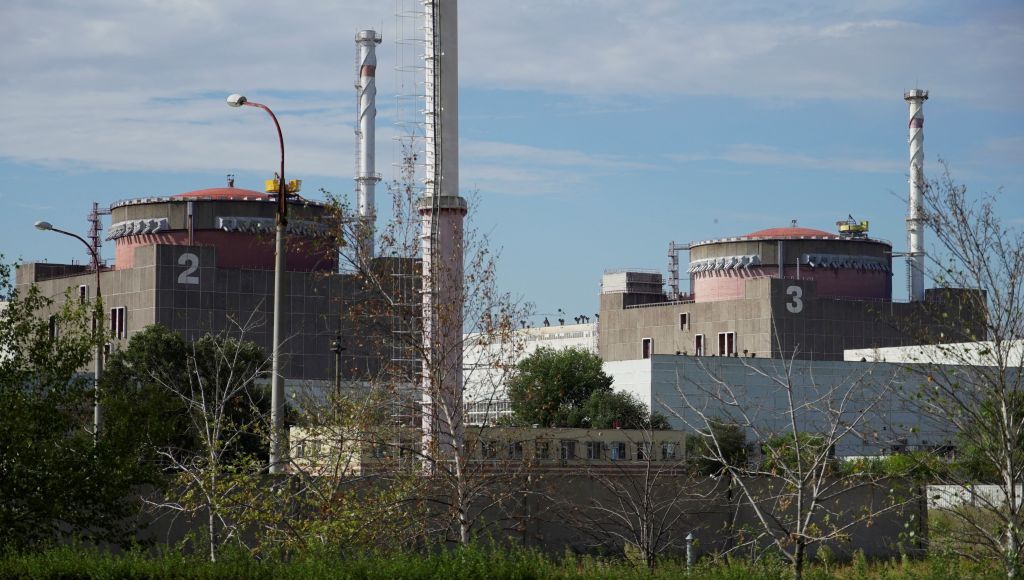Russia's Rosatom complicit in war crimes, report alleges, says treatment of power plant staff risks nuclear disaster

Zaporizhzhia Nuclear Power Plant in Russian-occupied Enerhodar, Ukraine, on March 29, 2023. (Stringer / Anadolu Agency via Getty Images)
Russia's state nuclear energy corporation, Rosatom, is complicit in war crimes including the detention and torture of staff at the Zaporizhzhia Nuclear Power Plant (ZNPP), adding to a growing risk of a nuclear disaster, a new report by Truth Hounds and Greenpeace Ukraine claims.
Russian forces took control of Energodar, home to Europe's largest nuclear power plant in March 2022, the first time in history that a military occupation took over such a facility.
"Right now, the Zaporizhzhya Nuclear Power Plant is like a time bomb, as the consequences (of Russia’s presence there) are unpredictable," Daryna Rogachuk, Greenpeace Ukraine representative, said at a presentation of the report on Sept. 24.
Russian nuclear giant Rosatom not only became the operator of the ZNPP after taking it from Ukraine’s control, but also played a leading role in the region’s political processes, cooperating with the Russian military and Federal Security Service (FSB), the report said.
Ukrainian workers at the site were forbidden from leaving due to their expertise in running the plant, and were forced to sign contracts with Rosatom.
According to the research, at least 226 civilian residents of Energodar have been unlawfully detained, including 78 ZNPP staff members.
"In November 2022, a Ukrainian ZNPP employee was summoned for a ‘talk’ with a representative of Rosatom and the FSB at an unspecified location on the territory of the ZNPP," Denys Sultanhaliiev, Truth Hounds senior researcher, told the Kyiv Independent.
"For refusing to sign a contract with Rosatom he was threatened with the blocking of his work pass, as well as a ban on evacuation and ‘sending to the basement.’"

The report details detainees being "deprived of food, water, and medical care, contrary to the provisions of international law," as well as torture "including beatings, electrocution, sexual violence, mock executions, and threats to family members of detainees."
At least six people are confirmed to have been tortured to death. Among them was Andriy Honcharuk, a ZNPP diver, who was held at Energodar Police Station. He died in an ambulance while being transported to the hospital.
Rosatom’s behaviour violates the International Atomic Energy Agency’s (IAEA) Seven Indispensable Pillars of Nuclear Safety and Security, in particular the principle that staff must operate free from undue pressure, Roman Koval, Truth Hounds’ head of research, said.
The report highlights how the mistreatment of Ukrainian staff escalates long-running safety concerns at the ZNPP as they are much better acquainted with the equipment than specialists brought in from Russia.
"In terms of hardware, the equipment itself, ours and the Russians’ are somewhat similar and of the same type — a pump, a gate valve, fittings, and so on. But the software is completely different from that of the Russians," a Ukrainian ZNPP staff member said.
The mistreatment of staff is just one aspect of Russia's militarization of the ZNPP that the report says is risking a nuclear disaster.
Roman Nitsovych, research director at DiXi Group, said during the presentation of the report that Arkhangel UAV operator school, which also manufactures drones, conducts training on ZNPP territory.
"They (Russians) know that Ukrainian defence forces cannot strike the territory of ZNPP and take advantage of this."
Rogachuk said that actions such as placing Russian Multiple Rocket Launch Systems (MRLS) near the ZNPP is "a major threat to the station."
“Right now, the Zaporizhzhya Nuclear Power Plant is like a time bomb, as the consequences (of Russia’s presence there) are unpredictable.”
Truth Hounds called on the international community not to cooperate with Rosatom.
"Rosatom bears responsibility for the crimes of occupation through its structural transformation from a technical operator to a central element of control over the occupied territory," Sultanhaliiev told the Kyiv Independent.
On Aug. 8, President Volodymyr Zelensky signed two decrees imposing sanctions against 18 individuals and 17 legal entities tied to Russia's energy sector.
They targeted those involved in integrating the Russian-occupied ZNPP into Russia's power grid, taking part in the seizure of the Chernobyl Nuclear Power Plant, and manufacturing or servicing dual-use nuclear equipment.
On Sept. 23, Russian troops reportedly struck a power line, severing the plant’s connection to Ukraine’s electrical grid. The final functioning line supplying electricity to the facility was cut at approximately 5 p.m. local time.
As a result, the plant has been forced to rely on backup diesel generators to maintain critical safety functions, according to Ukraine's state nuclear agency Energoatom.
"This creates a critical situation that threatens the security of not only Ukraine but also European countries," Energoatom said.










